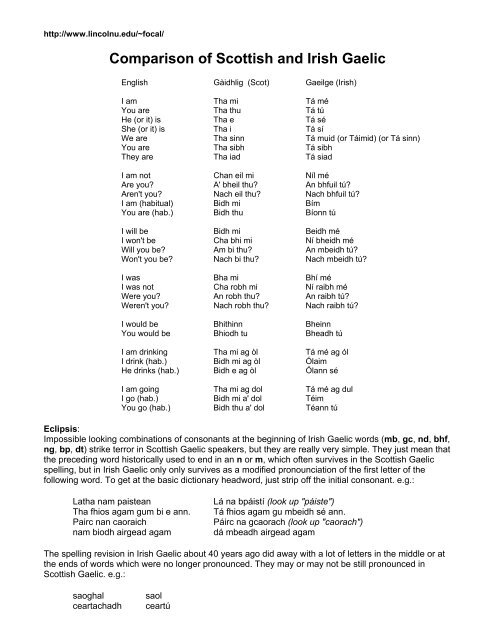Comparison of Scottish and Irish Gaelic - House McFionn
Comparison of Scottish and Irish Gaelic - House McFionn
Comparison of Scottish and Irish Gaelic - House McFionn
Create successful ePaper yourself
Turn your PDF publications into a flip-book with our unique Google optimized e-Paper software.
http://www.lincolnu.edu/~focal/<br />
<strong>Comparison</strong> <strong>of</strong> <strong>Scottish</strong> <strong>and</strong> <strong>Irish</strong> <strong>Gaelic</strong><br />
English Gàidhlig (Scot) Gaeilge (<strong>Irish</strong>)<br />
I am Tha mi Tá mé<br />
You are Tha thu Tá tú<br />
He (or it) is Tha e Tá sé<br />
She (or it) is Tha i Tá sí<br />
We are Tha sinn Tá muid (or Táimid) (or Tá sinn)<br />
You are Tha sibh Tá sibh<br />
They are Tha iad Tá siad<br />
I am not Chan eil mi Níl mé<br />
Are you? A' bheil thu? An bhfuil tú?<br />
Aren't you? Nach eil thu? Nach bhfuil tú?<br />
I am (habitual) Bidh mi Bím<br />
You are (hab.) Bidh thu Bíonn tú<br />
I will be Bidh mi Beidh mé<br />
I won't be Cha bhi mi Ní bheidh mé<br />
Will you be? Am bi thu? An mbeidh tú?<br />
Won't you be? Nach bi thu? Nach mbeidh tú?<br />
I was Bha mi Bhí mé<br />
I was not Cha robh mi Ní raibh mé<br />
Were you? An robh thu? An raibh tú?<br />
Weren't you? Nach robh thu? Nach raibh tú?<br />
I would be Bhithinn Bheinn<br />
You would be Bhiodh tu Bheadh tú<br />
I am drinking Tha mi ag òl Tá mé ag ól<br />
I drink (hab.) Bidh mi ag òl Ólaim<br />
He drinks (hab.) Bidh e ag òl Ólann sé<br />
I am going Tha mi ag dol Tá mé ag dul<br />
I go (hab.) Bidh mi a' dol Téim<br />
You go (hab.) Bidh thu a' dol Téann tú<br />
Eclipsis:<br />
Impossible looking combinations <strong>of</strong> consonants at the beginning <strong>of</strong> <strong>Irish</strong> <strong>Gaelic</strong> words (mb, gc, nd, bhf,<br />
ng, bp, dt) strike terror in <strong>Scottish</strong> <strong>Gaelic</strong> speakers, but they are really very simple. They just mean that<br />
the preceding word historically used to end in an n or m, which <strong>of</strong>ten survives in the <strong>Scottish</strong> <strong>Gaelic</strong><br />
spelling, but in <strong>Irish</strong> <strong>Gaelic</strong> only only survives as a modified pronounciation <strong>of</strong> the first letter <strong>of</strong> the<br />
following word. To get at the basic dictionary headword, just strip <strong>of</strong>f the initial consonant. e.g.:<br />
Latha nam paistean<br />
Tha fhios agam gum bi e ann.<br />
Pairc nan caoraich<br />
nam biodh airgead agam<br />
Lá na bpáistí (look up "páiste")<br />
Tá fhios agam gu mbeidh sé ann.<br />
Páirc na gcaorach (look up "caorach")<br />
dá mbeadh airgead agam<br />
The spelling revision in <strong>Irish</strong> <strong>Gaelic</strong> about 40 years ago did away with a lot <strong>of</strong> letters in the middle or at<br />
the ends <strong>of</strong> words which were no longer pronounced. They may or may not be still pronounced in<br />
<strong>Scottish</strong> <strong>Gaelic</strong>. e.g.:<br />
saoghal<br />
ceartachadh<br />
saol<br />
ceartú
If you can't find an <strong>Irish</strong> <strong>Gaelic</strong> word in a <strong>Scottish</strong> <strong>Gaelic</strong> dictionary, try changing unvoiced consonants<br />
(c p t) to the corresponding voiced consonant g b d (which may actually be pronounced unvoiced in<br />
<strong>Scottish</strong> <strong>Gaelic</strong> too), <strong>and</strong> try changing unstressed a or o to u. e.g.:<br />
sgian<br />
sgoil<br />
uisge<br />
scian<br />
scoil<br />
uisce<br />
agad<br />
comunn<br />
gu<br />
agat<br />
comann<br />
go<br />
For extensive lessons in speaking <strong>Gaelic</strong>, see<br />
http://www.irishpage.com/irishpeople/index.htm<br />
________________________________________________________________<br />
- Blessings -<br />
Go raibh tú daibhir i mí-áidh<br />
Agus saibhir i mbeannachtaí<br />
Go mall ag déanamh namhaid, go luath a déanamh carad,<br />
Ach saibhir nó daibhir, go mall nó go luath,<br />
Nach raibh ach áthas agat<br />
Ón lá seo amach.<br />
May you be poor in misfortune,<br />
Rich in blessings,<br />
Slow to make enemies,<br />
quick to make friends,<br />
But rich or poor, quick or slow,<br />
May you know nothing but happiness<br />
From this day forward.<br />
Mallachtaí - Celtic Curses<br />
• Go n-ithe an cat thú is go n-ithe an diabhal an cat. “go knee-huh on cat is go knee-huh on divel<br />
on cat”<br />
May the cat eat you, <strong>and</strong> may the devil eat the cat.<br />
• Titim gan éirí ort. “tit-him gahn ort”<br />
May you fall without rising.<br />
• Imeacht gan teacht ort. “im-ucht-gahn cha-kt”<br />
May you leave without returning.<br />
• Póg mo thóin. “powg uh muh hone”<br />
Kiss my butt!<br />
• Trasna ort féin. "traz nu ort fayne"<br />
Go... yourself!<br />
• Dóite agus loisceadh ort. "doch-uh ah-gus lus-kh\uh or-t"<br />
Burning <strong>and</strong> scorching on you.<br />
• Plá ar do theach. "p-law air duh hock"<br />
A plague on your house.<br />
• Go mbeadh cosa gloine fút agus go mbrise an ghloine "go my cuss-uh glin-uh foo-t ah-gus go<br />
mrishta un glin-uh"<br />
May you have glass legs <strong>and</strong> may the glass break



